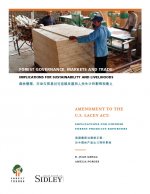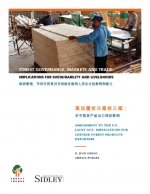Amendment to the U.S. Lacey Act
Implications for Chinese Forest Products Exporters
By R. Juge Gregg, Amelia Porges - Sidley Austin LLP, Sidley Austin LLP, Forest Trends View PublicationA recently passed law gives the U.S. government the power to fine, and even jail, individuals and companies who traffic in illegally harvested wood products. The U.S. government can even use this law, called the Lacey Act, to impose significant penalties on individuals and companies who do not realize that their wood is tainted. This new law, and the new import declaration it requires, will affect manufacturers and exporters who ship a variety of products made from wood to the United States, including paper, furniture, lumber, flooring, plywood or even picture frames. The U.S. Department of Justice already has warned that it intends to use the Act to prosecute those who import timber taken or transported in violation of the laws of the country in which the timber was originally harvested. Penalties under the Act include civil administrative penalties, forfeiture of the trafficked goods, criminal fines or imprisonment. A Lacey Act violation may also trigger charges of smuggling or money laundering. The Lacey Act will now apply to a broad range of imported wood products and species, far beyond those few species listed as endangered under the Convention on International Trade in Endangered Species (CITES).
China is one of the largest producers and suppliers of forest products for the U.S. market. In 2007, China exported 22% of its total wood product exports to the United States – mainly furniture, plywood and paper – totaling 15.7 million m3 RWE in volume and $8.5 billion in value. The U.S. has been one of China’s most rapidly growing markets.


